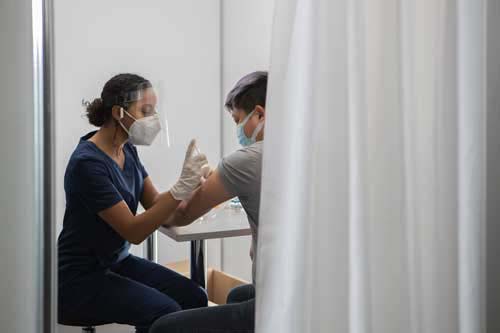COVID-19 vaccines are designed to elicit immune responses through the production of neutralizing antibodies (NAbs) – proteins that identify and neutralize viral particles – to combat the SARS-CoV-2 virus. Research indicates that immunity through the production of NAbs, particularly after infection with SARS-CoV-2, may be long-lasting.
Infections and vaccinations also generate memory B cells and T cells. Memory B cells are activated upon reinfection and manufacture high levels of antibodies from plasma cells in the bone marrow, even years after initial exposure. T cells, in the form of either CD4+ cells or CD8+ cells, attack and kill pathogens such as viral particles. Thus far, T cell responses to COVID-19 vaccines have been shown to be strong and long-lasting, even against different variants.1
Evidence to date suggests that individuals previously infected with SARS-CoV-2 who are subsequently vaccinated exhibit the best vaccine response and may not need a booster vaccine, but individuals not previously infected may require additional booster doses.
How is immunity achieved?
SARS-CoV-2 natural and vaccine-induced immunity is dependent on factors such as age, early immune response to infection, disease severity, initial efficacy of a vaccine, viral mutations, and underlying health conditions. For example, it has been reported that NAb titers against the South African B.1.351 variant in vaccinated individuals are between 7.6-fold and 9-fold lower compared to the original Wuhan virus.
The degree of immunity is also important, in that immunity provides protection against severe disease and mortality and not just infection and mild symptoms of disease. It is estimated that NAb levels required for protection against severe disease are about six times lower than the level required to protect against any symptomatic infection.2
Oxford researchers have identified average antibody levels required to prevent symptomatic COVID-19, referred to as “correlates of protection.” Higher levels of all immune markers were correlated with a reduced risk of symptomatic infection. Antibody responses did not correlate with overall protection against asymptomatic infection. There is no one level on any of the binding or NAb assays used that provides full protection against the virus.3
Studies are underway to examine the efficacy of one vaccine, which is later boosted by a different vaccine. A recent trial in England showed that vaccination with Pfizer two-dose schedule induced the highest antibody response but that vaccination with Oxford/AstraZeneca, followed by a Pfizer/BioNTech vaccine administered four weeks later induced the highest T cell response.4
A recent Spanish study supports the application of a heterologous schedule, administering different COVID-19 vaccines in one person. The ongoing trial showed significantly higher antibody levels in the intervention group administered with the AstraZeneca vaccine followed by Pfizer (2246.25 BAU/ml) compared to the control group administer with a single dose AstraZeneca (102.25 BAU/ml). Second doses of AstraZeneca have failed to show an improvement in cellular response obtained after the first dose.5
How long does vaccine immunity last?
Research indicates that vaccine-induced immunity may not last as long as natural immunity from past infection, and that booster vaccinations may be required. In previously infected, non-vaccinated individuals, the U.K. SIREN study found that the risk of reinfection was reduced by 84% for at least seven months, while a study in Qatar reported 90% protection against reinfection as much as a year after infection with SARS-CoV-2. 6
Evidence suggests that efficacy of vaccination declines by about 7% per month but stabilizes after time, and protection from severe disease is retained.2
Both Pfizer (BNT162b2) and Moderna (mRNA-1273) report that their vaccines provide at least six months of protection.7 In an ongoing Phase 1 trial in 33 participants, antibodies elicited by mRNA-1273 persisted through six months after the second dose, with detectable antibody activity lower in those aged 71 and over compared to those aged 18 to 55 years of age.8
A new study by the Washington University School of Medicine in St. Louis reported that immunity response to vaccines was strong and likely long-lasting. Volunteers who received the Pfizer vaccine were still producing immune cells from germinal centers (follicles), which train immune cells to recognize foreign bodies such as viruses, nearly four months after their first vaccination. Antibody response was enhanced further following a second vaccination.7
Trials in the U.K. are studying the effects of booster vaccinations 10-12 weeks following a second vaccine dose, with early findings expected this September, and the U.S. National Institute of Health is likewise studying booster doses in participants who were previously vaccinated.6
What about efficacy of vaccination in individuals with natural immunity from prior infection?
In uninfected individuals, antibody levels rise slowly following first vaccination and peak at one week post second vaccination. However, in previously infected individuals, antibody levels rise rapidly after first vaccination and peak at a higher level than uninfected individuals.7 Even if unvaccinated, they show an initial decline in antibody levels in the first three months following infection but maintain a relatively stable antibody level up to six months and beyond.9 Additional data suggests that immunity in previously infected individuals, particularly when boosted by an mRNA vaccine, will be very long-lasting and further protect against variants of SARS-CoV-2.10 Data from a Spanish study of health care workers previously infected with SARS-CoV-2 supports these findings, noting seropositivity was 96.88% up to 322-379 days post symptom onset, with a minimal rate of symptomatic re-infection (1.16%).9
Individuals who have previously been infected with SARS-CoV-2 have been found to have a powerful immune response to COVID-19 vaccines. Both the Pfizer and Moderna mRNA vaccines boost CD4+ T cell responses in previously infected individuals after only one dose.11 Specifically, CD4+ and CD8+ T cell responses in infected individuals or those who have additionally received an mRNA vaccine are not greatly affected by mutations of the SARS-CoV-2 virus.12
See also: mRNA vaccines: Is the future now?
NAbs against the South African B.1.351 variant in vaccinated individuals with a history of non-B.1.351 SARS-CoV-2 were found to be a 100 times higher than after infection alone, and 25 times higher than after vaccination alone with either AstraZeneca (ChAdOx1 nCoV-19) or Pfizer vaccines.11
Will variants affect immunity?
Variants of concern include the U.K. B.1.1.7 (alpha), the South African B.1.351.(beta), Brazil’s P.1 (gamma), and the most recent variant from India, the B.1.617.2 (delta) variant. Scientists are still evaluating the efficacy of existing vaccines against new variants, with trials already underway of modified vaccines to combat variants. Preliminary evidence suggests reduced efficacy of some vaccines against mild or moderate disease, but retained effectiveness against severe disease.
Johnson & Johnson recently reported that its single-shot vaccine (Ad26.COV2.S) generated strong persistent activity against the B.1.617.2 delta variant and that the durability of the immune response lasted at least eight months. NAbs did not decline and cellular immune response was particularly strong, with T cell responses continuing over time.13
In the study by the Washington University School of Medicine in St.Louis, volunteers who received the Pfizer vaccine had high levels of NAbs effective against three variants, including the B.1.351 variant from South Africa.7
Researchers at the University of Oxford have now shown that a third vaccine dose at least six months after the second dose of the AstraZeneca vaccine increases immunity back to peak levels, increasing antibody and T cell levels to combat the virus, including variants.14
Researchers are also studying variant-specific booster vaccines, with Moderna reporting an increase in antibody concentrations neutralizing SARS-CoV-2 and the B.1.351 variant following a booster vaccination using a spike protein sequence from the variant.6
With uncontrolled outbreaks and increasing transmission rates, there is a greater chance of the virus mutating further. Mutations in the viral spike protein are of greatest concern, and while it has been found that a few key amino acids in the spike protein have changed independently in variants, vaccines which incorporate these specific amino acids remain effective against several variants.15 The B.1.617.2 delta variant has 12 mutations in its spike protein but lacks mutations in its ACE2 receptor-binding domain (RBD), commonly associated with being able to evade NAbs. The Legacy Study in the U.K. found that NAb titers reduced by 5.8-fold against the delta variant, by 4.9-fold against the beta variant, and by 2.6-fold against the alpha variant, with increased age associated with reduced NAb titers.16 However, a recent study by Tarke et al found little impact on CD4+ and CD8+ T cell responses to all four variants of concern with the Pfizer and Moderna mRNA vaccines.12
Conclusion
While vaccinated and previously infected individuals have demonstrated immunity to SARS-CoV-2 after many months, emerging variants and reduced immunity in older lives may mean that booster vaccinations are required to restore antibody levels and avoid severe disease and death. Better understanding of the duration of immunity protection and protection against variants will help in the future development and modifications of SARS-CoV-2 vaccines. Evidence to date suggests that individuals previously infected with SARS-CoV-2 who are subsequently vaccinated may not need a booster vaccine, but individuals not previously infected may require another vaccine.
Insurers will need to incorporate the emerging data on immunity duration and the potential need for boosters, along with vaccine access and uptake rates, into mortality and morbidity models in order to predict and anticipate population and insured-lives outcomes in the coming months and years.



